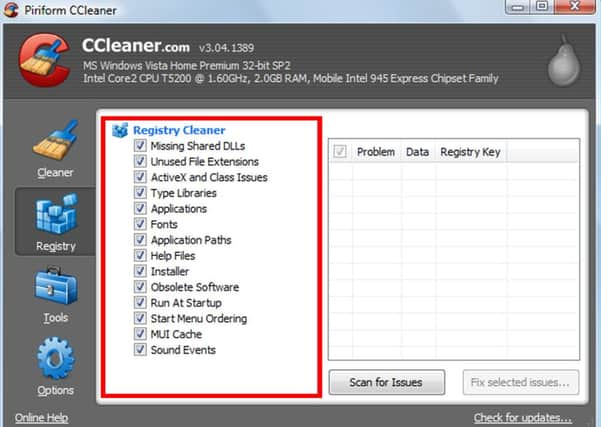When I’m cleaning Windows


ONE of the many reasons for the popularity among home users of iPads over PCs is that they don’t slow down over time. Windows, on the other hand, is the HGV on the information superhighway: the more you load it with, the slower it goes.
So it’s worth spending an hour now and again tuning up your machine for maximum performance. You’ll never make it go as fast as when it was new, but at least you can get it into the middle lane.
Advertisement
Hide AdAdvertisement
Hide AdStart by installing a free program called CCleaner from www.piriform.com. This has the dual purpose of uninstalling software you no longer need and removing old files and other junk left behind, for instance from when your PC has crashed.
You can tell the program exactly what to get rid of, or put it in automatic mode and let it go.
CCleaner can also clean up your system’s registry, the place Microsoft stores information about all the programs on your machine. One glance at it is enough to convince you that Windows is to modern computing what the Flat Earth Society is to cartography – but CCleaner makes it easy to sweep through and remove extraneous references. It will also show you which programs are set to start automatically when you turn on your PC; removing unnecessary ones from the list can speed up boot time dramatically.
Next, download and run another free tool called Malwarebytes Anti-Malware – the purpose of which is to seek out and remove software you didn’t even know you had. This is typically advertising-driven debris which redirects web searches to “special offer” pages of dubious provenance. Be sure to download Malwarebytes software only from its official site,www.malwarebytes.org; others may be themselves malware.
Advertisement
Hide AdAdvertisement
Hide AdIf you’re still using Internet Explorer to browse the web, this would be a good time to stop. It’s less secure than its rivals and more susceptible to new attacks from advert vendors and others. The figures on IE’s global use speak for themselves: down from 85% of the total browser market in 2002 to just 13% this time last year and a mere nine per cent now. Most of those users (55% at the last count) have migrated to Google’s Chrome, which is free and updates itself frequently and automatically. Firefox is a credible alternative, popular with users who like to tinker under the bonnet.